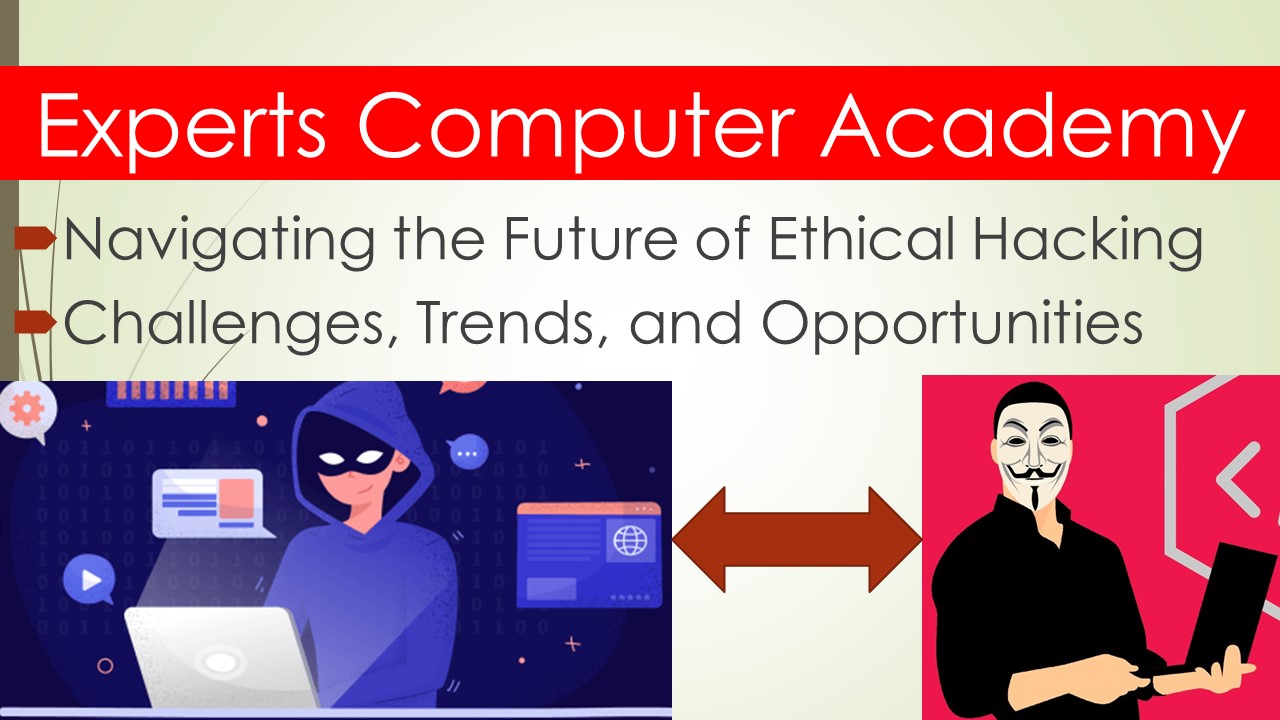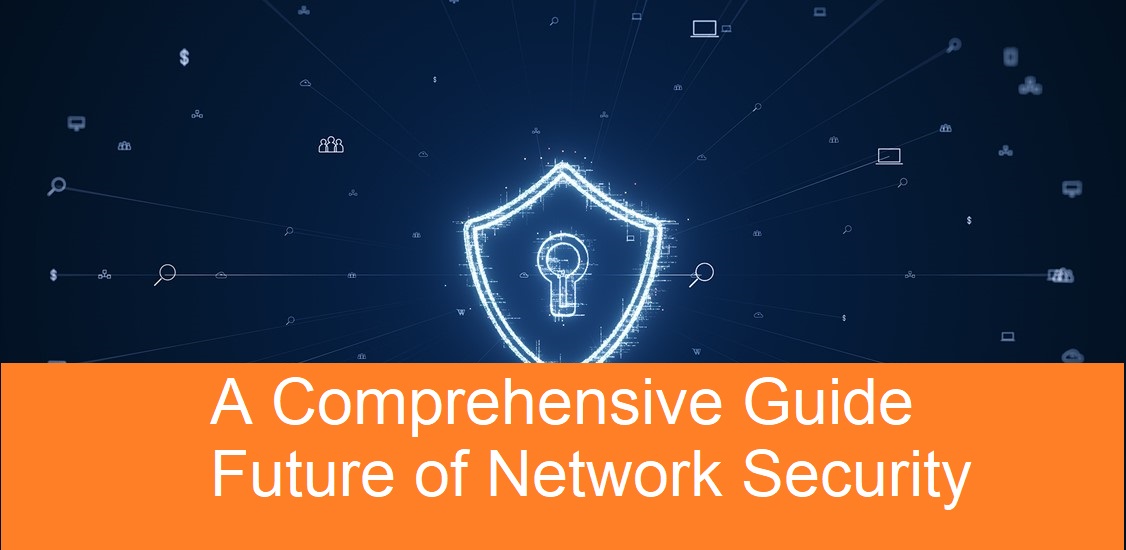Introduction of Ethical Hacking:
In the dynamic landscape of cybersecurity, ethical hacking plays a pivotal role in safeguarding digital infrastructures. Ethical hackers, also known as white-hat hackers, employ their skills to identify vulnerabilities, strengthen security protocols, and prevent malicious cyber-attacks. As technology evolves, so too does the field of ethical hacking. This article explores the future trajectory of ethical hacking, examining emerging challenges, trends, and opportunities.
The Evolution of Ethical Hacking:
Ethical hacking has come a long way since its inception. Initially viewed with skepticism, ethical hacking has gained recognition as a critical component of cybersecurity strategies. Organizations across various industries now employ ethical hackers to proactively assess and enhance their security posture. With the proliferation of cyber threats, the demand for skilled ethical hackers continues to escalate.
Challenges Facing Ethical Hackers:
As technology advances, ethical hackers face an array of challenges. One such challenge is the growing complexity of digital ecosystems. With the rise of cloud computing, IoT devices, and interconnected networks, ethical hackers must navigate intricate environments to identify vulnerabilities effectively. Additionally, the rapid pace of technological innovation often outpaces security measures, leaving systems susceptible to exploitation.
Another challenge lies in the ethical considerations surrounding hacking activities. While ethical hackers operate with noble intentions, their actions may raise ethical dilemmas, particularly concerning privacy and data protection. Striking the right balance between security and individual liberties remains an ongoing challenge for the ethical hacking community.
Emerging Trends in Ethical Hacking:
Despite these challenges, several trends are shaping the future of ethical hacking. One notable trend is the increasing emphasis on automation and artificial intelligence (AI). Ethical hackers are leveraging AI-driven tools to streamline vulnerability assessments, identify threats, and respond to cyber incidents promptly. Machine learning algorithms can analyze vast datasets, enabling ethical hackers to detect anomalous patterns and mitigate risks more efficiently.
Another trend is the integration of ethical hacking into DevOps processes. By embedding security measures throughout the development lifecycle, organizations can proactively address vulnerabilities and enhance resilience against cyber threats. Ethical hackers collaborate closely with development teams, conducting continuous security testing and fostering a culture of security awareness.
Furthermore, the advent of bug bounty programs has transformed the ethical hacking landscape. Bug bounty platforms facilitate collaboration between organizations and independent security researchers, incentivizing the discovery and disclosure of security vulnerabilities. These programs promote transparency, accountability, and community engagement, ultimately strengthening the overall security posture of organizations.
Opportunities for Ethical Hackers:
As the demand for cybersecurity professionals continues to soar, ethical hackers are presented with numerous opportunities for career advancement and specialization. With specialized certifications such as Certified Ethical Hacker (CEH) and Offensive Security Certified Professional (OSCP), individuals can demonstrate their expertise and credibility in the field. Moreover, ethical hackers can diversify their skill sets by exploring niche areas such as mobile security, blockchain technology, and industrial control systems.
Additionally, ethical hackers can play a pivotal role in promoting cybersecurity awareness and education. By sharing their knowledge through workshops, training programs, and community events, they can empower individuals and organizations to bolster their defenses against cyber threats. Furthermore, ethical hackers can contribute to the development of open-source security tools and frameworks, fostering innovation and collaboration within the cybersecurity community.
The future of ethical hacking is both promising and challenging. As technology continues to evolve, ethical hackers must adapt to new threats and vulnerabilities while upholding ethical principles and legal standards. By embracing emerging trends, leveraging advanced technologies, and fostering collaboration, ethical hackers can stay ahead of cyber adversaries and safeguard the digital ecosystem for years to come.
Who Should Learn Ethical Hacking?
Ethical hacking is a valuable skillset that can benefit a wide range of individuals and organizations. Here’s who should consider learning ethical hacking and why:
1. Cybersecurity Professionals: Cybersecurity specialists, including security analysts, penetration testers, and incident responders, can enhance their expertise by learning ethical hacking techniques. Understanding how hackers operate enables cybersecurity professionals to better defend against evolving threats, identify vulnerabilities, and implement robust security measures.
2. IT Administrators and Network Engineers: IT professionals responsible for managing networks, systems, and infrastructure can benefit from learning ethical hacking principles. By gaining insights into common attack vectors and vulnerabilities, they can proactively mitigate risks, configure secure environments, and implement effective security controls.
3. Software Developers: Software developers play a crucial role in building secure applications and systems. Learning ethical hacking can help developers identify security flaws in their code, adhere to best practices for secure coding, and integrate security testing into the software development lifecycle (SDLC). By prioritizing security from the outset, developers can reduce the likelihood of breaches and data breaches.
4. Business Owners and Managers: Business leaders need to understand the importance of cybersecurity and its implications for their organizations. Learning ethical hacking can provide insights into the security risks facing their businesses, enabling them to make informed decisions about resource allocation, risk management, and cybersecurity investments. Moreover, business owners and managers can leverage ethical hacking knowledge to assess the security posture of their vendors, partners, and supply chains.
5. Students and Aspiring Professionals: Students pursuing careers in cybersecurity or related fields can gain a competitive edge by learning ethical hacking skills early in their academic journey. By acquiring hands-on experience through ethical hacking labs, courses, and certifications, aspiring professionals can demonstrate their proficiency to prospective employers and stand out in a competitive job market.
Why should one learn ethical hacking?
Here are several compelling reasons:
1. Combat Cyber Threats: With cyber threats becoming increasingly sophisticated and pervasive, learning ethical hacking equips individuals with the knowledge and skills to identify and mitigate security risks effectively. By understanding the tactics, techniques, and procedures (TTPs) employed by malicious hackers, ethical hackers can proactively defend against cyber-attacks and safeguard digital assets.
2. Enhance Career Opportunities: In today’s digital economy, cybersecurity skills are in high demand across various industries. By learning ethical hacking, individuals can unlock a plethora of career opportunities in cybersecurity, ranging from penetration testing and security consulting to incident response and threat analysis. Certified ethical hackers often command higher salaries and enjoy greater job security in a rapidly evolving field.
3. Foster Innovation and Problem-Solving: Ethical hacking involves thinking creatively, analytically, and strategically to uncover security vulnerabilities and devise effective countermeasures. By engaging in hands-on challenges and real-world scenarios, individuals can hone their problem-solving skills, cultivate a hacker mindset, and foster a culture of innovation within organizations.
4. Promote Ethical Conduct and Responsibility: Ethical hacking emphasizes the importance of conducting security testing and vulnerability assessments in a responsible and lawful manner. By adhering to ethical guidelines, individuals can uphold integrity, respect user privacy, and avoid inadvertently causing harm or disruption to systems and networks. Ethical hackers play a critical role in promoting ethical conduct within the cybersecurity community and building trust with stakeholders.
5. Stay Ahead of the Curve: Cybersecurity is an ever-evolving field, with new threats and vulnerabilities emerging regularly. By staying informed about the latest trends, techniques, and technologies in ethical hacking, individuals can stay ahead of cyber adversaries and adapt to evolving security challenges effectively. Continuous learning and professional development are essential for staying relevant and competitive in the fast-paced world of cybersecurity.
In summary, learning ethical hacking is beneficial for individuals and organizations alike, enabling them to combat cyber threats, enhance career opportunities, foster innovation, promote ethical conduct, and stay ahead of the curve in an increasingly digital world. By investing in ethical hacking education and training, individuals can play a proactive role in safeguarding the integrity, confidentiality, and availability of digital assets and infrastructure.
Why hacking is more preferable than other fields of IT
While hacking may be appealing to some individuals, it’s essential to clarify that ethical hacking, also known as white-hat hacking, is a subset of the broader field of cybersecurity. Ethical hackers use their skills and knowledge to identify vulnerabilities, assess security measures, and protect systems from malicious attacks. Here are some reasons why ethical hacking may be preferable to other fields of IT for certain individuals:
1. Hands-On and Dynamic Work: Ethical hacking involves hands-on problem-solving, critical thinking, and continuous learning. For individuals who thrive in dynamic environments and enjoy solving puzzles, ethical hacking offers an opportunity to engage in stimulating and challenging work on a daily basis.
2. Impactful Contribution to Security: Ethical hackers play a crucial role in strengthening cybersecurity defenses and protecting sensitive information from cyber threats. By identifying and remediating vulnerabilities, ethical hackers contribute to the overall security posture of organizations, mitigating the risk of data breaches, financial losses, and reputational damage.
3. High Demand and Career Opportunities: With the escalating frequency and sophistication of cyber attacks, the demand for cybersecurity professionals, including ethical hackers, is on the rise. Ethical hackers can pursue diverse career paths, including penetration testing, security consulting, incident response, and security research. Moreover, ethical hackers often enjoy competitive salaries, job stability, and opportunities for career advancement in a rapidly growing field.
4. Ethical and Legal Framework: Unlike malicious hackers, ethical hackers operate within a strict ethical and legal framework. Ethical hacking emphasizes integrity, professionalism, and adherence to ethical guidelines and legal regulations. By conducting security testing in a responsible and lawful manner, ethical hackers uphold ethical standards, respect user privacy, and protect the rights of individuals and organizations.
5. Continuous Learning and Skill Development: Cybersecurity is an ever-evolving field, with new threats, vulnerabilities, and technologies emerging regularly. Ethical hackers must stay informed about the latest trends, techniques, and tools in cybersecurity to remain effective in their roles. Continuous learning and skill development are integral to success in ethical hacking, offering opportunities for personal and professional growth.
6. Contribution to Society: Ethical hackers contribute to the greater good by defending against cyber threats and protecting digital infrastructure. Their efforts help safeguard critical systems and services, including financial institutions, healthcare organizations, government agencies, and educational institutions. By promoting cybersecurity awareness and resilience, ethical hackers play a vital role in building trust, stability, and security in the digital ecosystem.
While ethical hacking offers numerous advantages, it’s essential to recognize that it may not be suitable for everyone. Ethical hacking requires a strong understanding of computer systems, networking, programming languages, and cybersecurity concepts. Moreover, ethical hackers must possess integrity, professionalism, and a commitment to upholding ethical standards and legal regulations. Individuals considering a career in ethical hacking should evaluate their skills, interests, and values to determine if it aligns with their aspirations and goals in the field of cybersecurity.







